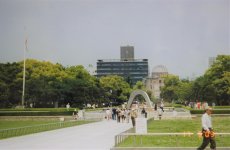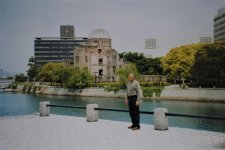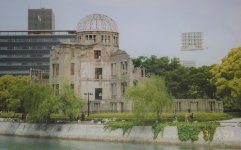OLDNAVYMCPO
US Veteran, Absent Comrade
On Aug 6,1945, Col. Paul Tibbets piloted a modified B-29 , called Enola Gay, from a base on Tinian Island. Using the Aioi Bridge in the city of Hiroshima, Japan as an aiming point, the plane dropped the first ever combat atomic bomb, "Little Boy". The bomb exploded at 2,000 feet above Hiroshima, destroying five square miles of the city.
The Japanese failed to surrender, so on Aug 9, Maj. Charles Sweeney flew another B-29, Bockscar, from Tinian to the secondary target of Nagasaki. He dropped the plutonium bomb, "Fat Man".
On Aug 15, 1945, Japan surrendered. The formal surrender documents were signed aboard the USS Missouri in Tokyo Bay the following month.
Peace Memorial Park in Hiroshima.
Me in front of the Hiroshima Genbaku Dome, one of the few buildings left standing after the bomb. The bridge to the left in the photo is the aiming point, Aioi Bridge.
A closer view of the Hiroshima Genbaku Dome.
The USS Missouri in Pearl Harbor where the war with Japan began.
The Japanese failed to surrender, so on Aug 9, Maj. Charles Sweeney flew another B-29, Bockscar, from Tinian to the secondary target of Nagasaki. He dropped the plutonium bomb, "Fat Man".
On Aug 15, 1945, Japan surrendered. The formal surrender documents were signed aboard the USS Missouri in Tokyo Bay the following month.
Peace Memorial Park in Hiroshima.
Me in front of the Hiroshima Genbaku Dome, one of the few buildings left standing after the bomb. The bridge to the left in the photo is the aiming point, Aioi Bridge.
A closer view of the Hiroshima Genbaku Dome.
The USS Missouri in Pearl Harbor where the war with Japan began.





